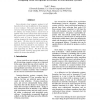Free Online Productivity Tools
i2Speak
i2Symbol
i2OCR
iTex2Img
iWeb2Print
iWeb2Shot
i2Type
iPdf2Split
iPdf2Merge
i2Bopomofo
i2Arabic
i2Style
i2Image
i2PDF
iLatex2Rtf
Sci2ools
102
click to vote
ACSAC
2004
IEEE
2004
IEEE
Designing Good Deceptions in Defense of Information Systems
Since attackers trust computer systems to tell them the truth, it may be effective for those systems to lie or mislead. This could waste the attacker's resources while permitting time to organize a better defense, and would provide a second line of defense when access controls have been breached. We propose here a probabilistic model of attacker beliefs in each of a set of "generic excuses" (including deception) for their inability to accomplish their goals. We show how the model can be updated by evidence presented to the attacker and feedback from the attacker's own behavior. We show some preliminary results with human subjects supporting our theory. We show how this analysis permits choosing appropriate times and methods to deceive the attacker.
Related Content
| Added | 20 Aug 2010 |
| Updated | 20 Aug 2010 |
| Type | Conference |
| Year | 2004 |
| Where | ACSAC |
| Authors | Neil C. Rowe |
Comments (0)

